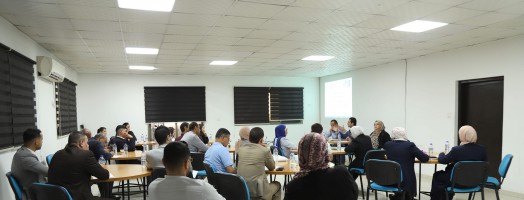The Reality of Working Women's Participation in Justice Facilities
In her opening remarks, Ms. Lina al-Tounisi, Coordinator of the IoL Gaza Office, welcomed the speaker and audience and made a briefing note about the Birzeit Legal Encounters Programme. Dr. Shubeir discussed the role and impact of female staff members of justice facilities in the Gaza Strip on maintaining the privacy of women when they listen and provide legal advice to these women. Dr. Shubeir stressed the importance and role of female lawyers in women’s access to justice.
Dr. Shubeir addressed three issues. Firstly, in relation to the reality of working women’s participation in police and security services, positive engagement with the cases of battered women requires the participation of women working in justice facilities of all kinds. This support starts with recruiting female police officers who could deal with women, both as complaints and defendants, ensuring their privacy, providing all comforts, giving confidence, and encouraging them to move forward to access justice. In this context, Dr. Shubeir highlighted that what was needed was not a women’s police force. Rather, the tasks and powers of the Family and Children Departments at police stations should be enhanced and promoted. He indicated that women’s representation in the police service was low.
Secondly, on women’s participation in the Public Prosecution, Dr. Shubeir showed that there were five or six female assistants to prosecutors. Compared to 75 male prosecutors, there is not a single female prosecutor. Female presence in the Public Prosecution is a key requirement for access to justice in gender based cases. This is a constitutional requirement, which has a positive bearing on women. The absence of female investigators, criminologists, and judicial officers will negatively impact female complainants and defendants. On the other hand, male investigators find it extremely difficult to understand women’s psychology. When they feel embarrassed in some cases, women’s psychological condition drives them to take a passive attitude without hesitation.
Thirdly, Dr. Shubeir explored the impact of women’s participation in the judiciary on women’s right to legal recourse and access to justice. There are only two female judges out of 70 judges in Gaza. Procedures for applications for judicial office have made it difficult for women to be appointed as judges. Women are absent from courts. Court proceedings are so critical as they culminate in decisive judgements, which put an end to disputes and cases. As a consequence, women are deprived of their rights in cases to which they are parties. Female judges may, therefore, provide a crucial factor to support women. Female judges have the skill of recognising body language as well as drawing statements and facts. Dr. Shubeir made clear that the very low presence of women in the justice sector components was attributed to the nature of the patriarchal society of Gaza and to the way advertisements for judicial posts are drafted. In addition to the religious nature of the community, the public have recourse to informal (tribal) judicial system in some cases in general, and in cases involving women in particular. This was one of the key reasons that cause women to refrain from applying for judicial posts at different legal facilities.
Many interventions and recommendations were made in ensuing discussion. Most importantly, the principle of women’s access to justice needs to be consolidated by putting in place mandatory constitutional provisions. Effective laws should be amended to preserve the rights of women, including complainants, addressees of complaints, litigants, and defendants. In addition to defending themselves as they desire, women will be enable to make statements in full freedom and without hesitation. To this avail, women will be strongly visible throughout justice sector facilities. In particular, when they defend themselves in certain cases, women need to be heard by fellow women in issues of privacy and gender.








